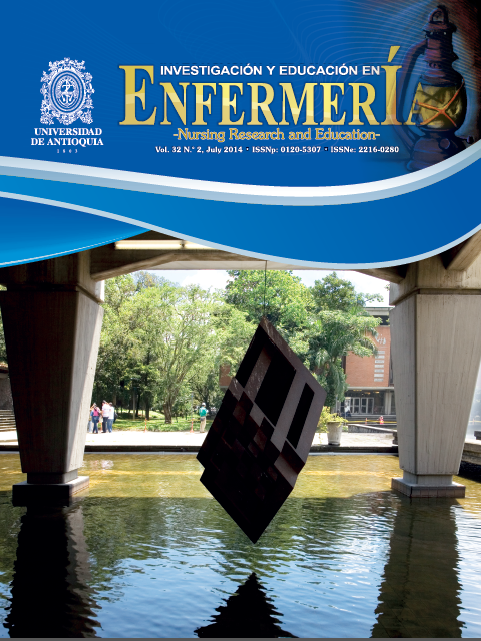Discovering the healthcare beliefs and practices of rural mestizo Ecuadorians. An ethnonursing study
DOI:
https://doi.org/10.17533/udea.iee.19971Keywords:
Ecuador, qualitative research, health knowledge, attitudes, practice, rural settlements.Abstract
Objetive. To discover and understand the healthcare beliefs and practices of mestizo Ecuadorians within rural Ecuador.
Methodology. An ethnonursing method developed by Leininger was used to guide this study and four phases of qualitative data analysis. 28 informants were interviewed in Tosagua, Ecuador.
Results. Data analysis revealed four themes (a) Spirituality and prayer necessary for health and well-being, (b) Sharing life with people positively affects health and well-being, (c) Incorporation of both traditional and modern medicine is essential to health (d) Environmental context beyond the control of the people greatly affect health and well-being.
Conclusion. The findings are consistent with the cultural life ways of rural mestizo Ecuadorians who live in community with one another. These results can be used to enable nurses and other healthcare workers to provide care that is acceptable, culturally congruent and promotes health in rural Ecuador.
Downloads
References
(1) Central Intelligence Agency.World Factbook [Internet]. CIA [cited Feb 6, 2014]. Available from: https://www.cia.gov/library/publications/the-world-factbook/.
(2) United States Agency for International Development -USAID/Ecuador. Lessons Learned Review: Decentralization and Democratic Local Governance Project. Burlington: USAID; 2006.
(3) Finerman R. Tracing Home-based Health Care Change in an Andean Indian Community. Med Anthropol Q. 1989; 3(2):162-74.
(4) Price L. In the Shadow of Biomedicine: Self Medication in Two Ecuadorian Pharmacies. Soc Sci Med. 1989; 28(9):900-15.
(5) Puertas B, Schlesser, M. Assessing community health among indigenous populations in Ecuador with a participatory approach: Implications for health reform. Journal of Community Health. 2001;26(2):133-47.
(6) Schoenfeld N, Juarbe TC. From Sunrise to Sunset: An Ethnographyof Rural Ecuadorian Women's Perceived Health Needs and Resources. Health Care Women Int. 2005; 26(10):957-77.
(7) CDC. Healthy People 2020 [Internet]. Atlanta: United States Department of Health and Human Services; 2011 [cited Feb 13, 2012]; Available from: http://www.healthypeople.gov/2020/chart.aspx?raceId=5&ageId=16&genderId=3&race=Hispanic&age=All+ages&gender=Both
(8) Leininger M, McFarland M. Culture Care Diversity and Universality. Second ed. Boston: Jones and Bartlett; 2006.
(9) Moss JA. [Discovering the Healthcare Beliefs and Practices of Rural Mestizo Ecuadorians]. Unpublished raw data; 2008.
(10) Leininger M. Transcultural nursing: Concepts, theories, research, and practice. New York: McGraw Hill; 2002.
(11) Betancourt JR, Carillo JE, Green AR, Maina A. Barriers to health promotion and disease prevention in the Lation population. Clin Cornerstone. 2004; 6(3):16-29.
(12) Caballero E. Understanding the Hispanic/Latino Patient. Am J Med. 2011;124(10 supplement): S10-S5.
(13) Schumacher G. Culture Care Meanings Beliefs and Practices in Rural Dominican Republic. J Transcult Nurs. 2010; 21(2):93-103.
(14) Magilvy JK, Congdon JG, Martinez RJ, Davis R, Averill J. Caring for our own: Health care experiences of rural Hispanic elders. J Aging Stud. 2000; 14(2):171-90.
(15) Shuster GF, Clough DH, Higgins PG, Klein BJ. Health and Health Behaviors Among Elderly hispanic Women. Geriatr Nurs. 2009;30(1):18-27.
(16) Vega W, Rodriguez M, Gruskin E. Health Disparities in the Latino Population. Epidemiol Rev. 2009; 31(1):99-112.
(17) Zoucha R, Reeves J. A view of professional caring as personal for Mexican American. International J Hum Caring. 1999; 3(3):14-29.
(18) Morgan MG. Prenatal care of African-American women in selected USA urban and rural cultural contexts. J Trancult Nurs. 1996; 7(2):3-9.
(19) Morgan MG. Leininger's theory of culture care diversity and universality in nursing practice. In: Alligood MR, Tomey AM, editors. Nursing theory utilization & application St. Louis: Mosby; 2002.
(20) American Association of Colleges of Nursing. The Essentials of Baccalaureate Education for Professional Nursing Practice. 2013 [cited Jan 12, 2014]; Available from: http://www.aacn.nche.edu/education-resources/essential-series
Downloads
Published
How to Cite
Issue
Section
License
Derechos de propiedad / Direitos de Propriedade
English: If the article is accepted for publication, all copyright will be of exclusive property of Investigación y Educación en Enfermería. The text and the graphics included in the publication are exclusive responsibility of the authors and not necessarily reflect the thought of the Editorial Committee.
Español: Si el artículo es aprobado para publicación, todos los derechos son de propiedad de Investigación y Educación en Enfermería. El texto y las gráficas incluidas en la publicación son de exclusiva responsabilidad de los autores y no necesariamente refleja el pensamiento del Comité Editorial.
Português: Se o artigo for aceito para publicação, todos os direitos autorais serão de propriedade exclusiva de Investigación y Educación en Enfermería. O texto e os gráficos incluídos na publicação são de responsabilidade exclusiva dos autores e não refletem necessariamente o pensamento do Comitê Editorial.















